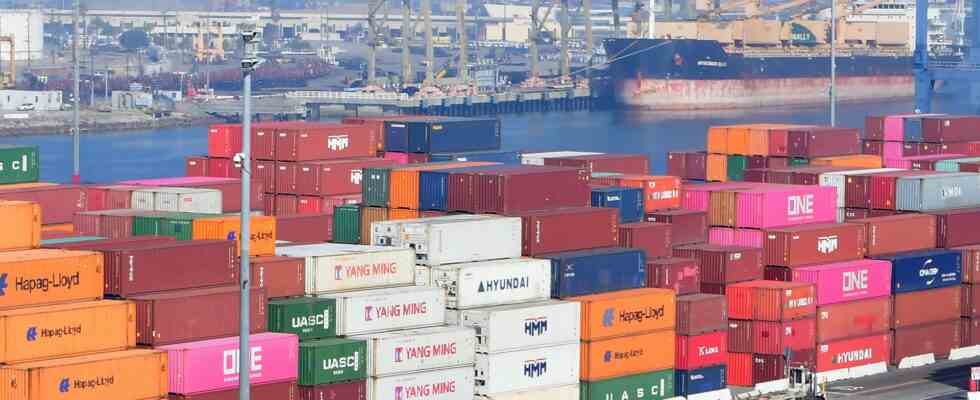Status: 05.10.2022 15:04
Despite many disruptive factors, the World Trade Organization (WTO) has increased its forecast for world trade this year. German export figures are also increasing. By 2023 at the latest, however, this should look different.
Cooling economy, rising interest rates and the energy crisis as a result of the Ukraine war: Despite numerous shock waves, world trade is growing surprisingly faster this year than assumed in spring. The World Trade Organization (WTO) now expects growth in the volume of goods trade of 3.5 percent for 2022, as it reported today in Geneva. In her forecast in April, she had only assumed 3.0 percent.
On the other hand, economists expect the Russian attack on Ukraine, the pandemic and the consequences of climate change to cause drastic slowdowns in the coming year. For 2023, they lowered their forecast significantly from 3.4 to 1.0 percent. Since April, the situation has “worsened considerably,” said WTO chief Okonjo-Iweala. If things get worse, world trade could even contract afterwards.
According to the WTO, economic growth in 2023 will be significantly weaker
The WTO continues to expect global economic growth of 2.8 percent for 2022. In the coming year, she expects 2.3 percent, i.e. around one percentage point less than in spring. Import demand is falling in the larger economies for a variety of reasons, the WTO reported. She cites the high energy prices in Europe, which, among other things, reduced consumer spending, the rise in interest rates in the USA and the production interruptions due to coronavirus outbreaks in China.
“The global economy is facing a variety of crises,” said Okonjo-Iweala. The strict monetary policy in the industrialized countries is also restricting economic growth in many parts of the world. When it comes to inflationary pressures, however, the WTO assumes that they may have peaked.
German exports are also increasing
The revision of the forecast for 2022 is mainly due to statistical adjustments and the availability of better data, writes the WTO. An increase in export volume of 1.8 percent is expected for Europe. Exports in Germany have recently picked up again. Exports in August increased by 1.6 percent compared to July, the Federal Statistical Office announced today. Goods worth 133.1 billion euros were delivered, an increase of 18.1 percent compared to August 2021.
The WTO expects an increase in export volume of 2.9 percent for Asia, 3.4 percent for North America and 14.6 percent for the Middle East region. In the CIS community from the successor states of the Soviet Union, however, the export volume will decline by 5.8 percent according to the forecast. In terms of imports, the CIS recorded a minus of 24.7 percent, while imports in Asia rose by 0.9 percent, in Europe by 5.4 percent and in North America by 8.5 percent.
The WTO explained that forecasts for the coming year are difficult because the progress of the Russian war of aggression or possible further interest rate hikes are difficult to predict. If things go badly, global trade in goods could also shrink by 2.8 percent in 2023 according to the forecast models. In the best case, growth of 4.6 percent is possible.
Germany, with its strong export industry, is particularly at risk
In Germany, experts are also skeptical about the future due to the exploding energy prices, the problems in the supply chains and the slowdown in the global economy. “The slight growth in exports in August is just a last flare-up before a cold export winter,” said Volker Treier from the German Chambers of Industry and Commerce (DIHK). Thomas Gitzel, chief economist at VP Bank, made a similar statement. It gives hope that “German exporters got away with it again in the third quarter with a black eye.” However, the economic prospects for the global economy became increasingly gloomy.
That could hit Germany hard. “The German economy, with its strong export industry, is particularly exposed to the global economic adversities,” explained Gitzel. It can be assumed that the export business will dampen economic growth.
Meanwhile, the WTO has warned governments against putting up trade barriers in view of the difficult environment. A withdrawal from global supply chains could increase inflationary pressures, limit economic growth and reduce living standards. Free trade is also necessary to deal with climate change in order to exchange new technologies. Okonjo-Iweala stressed that governments should not lose sight of the long-term goals of limiting climate change when dealing with short-term problems such as energy supply.

